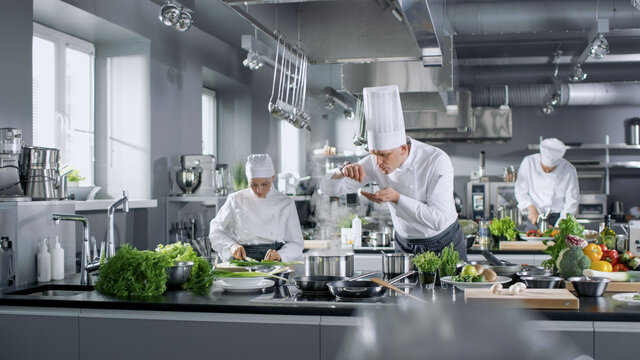Catering kitchens
Where everything is carefully considered for a conducive work environment

Mushy vegetables have long made way for healthier options in canteens: crunchy salads, chickpea curry, Buddha bowls and seitan dim sum. But how healthy and climate-friendly are things behind the scenes? We take a look around two canteens. Come with us!
Green growth at Zhejiang University
In 2012, the Beijing Government put green growth on the agenda for the whole of China, creating ever more demand for sustainable ways to work and do business. Zhejiang University was working with MEIKO way back in 2009, so the institution was already in good hands when it came to energy efficient planning and work routines.
Chen Ping, Logistics Support Manager at Zijingang Campus, and his team were looking for environmentally friendly solutions that could save energy in the university's kitchens in the medium and long term. MEIKO warewashing solutions, including dishwashing machines and food waste treatment, are doing this work on all six of the university's campuses. And all campuses have sent positive feedback about how safely, reliably and resource efficiently the machines run.
‘We are using MEIKO dishwashing machines on all of our sites and the feedback we have received has consistently been positive. Safety and reliability, as well as energy efficiency, are all very good.’
Chen Ping, Logistics Support Manager, Zijingang Campus

Relaxed work in the Hamburg canteen
Hamburg Studierendenwerk is one of the largest student support networks in Germany. Up to 23,000 students, researchers, employees, teaching staff and professors eat and drink here every day. A huge range of food and drink is available across 13 canteens, 17 cafés and six coffee shops, and all of it is produced fresh each day. The kitchen staff have lots to do! The tray return used to get stuck, especially at peak times. But that is a thing of the past. The dishwashing area was analysed by specialists from REFA and has now been completely refitted:
Hamburg Studierendwerk's dishwashing area in testing
BEFORE
AFTER
RESULT:
Refurbishing the dishwashing area created optimum working conditions: shorter routes, lots of time saved, improved staff satisfaction and productivity. This is truly a win-win situation for employer and employee.
‘Productivity has increased, employee satisfaction has increased, paths have been shortened and time saved. In summary, it is good for the people, and it is good for the company.’ enthuses Michael Gradtke.
Michael Gradtke, Manager of University Food Services

Human and machine working in partnership

The M-iQ flight type dishwashing machine is especially well suited to use in hectic commercial kitchens. The key advantage is its integrated MEIKO GreenEye Technology which significantly reduces energy, detergent and water usage. This smart technology only washes at points on the conveyor belt where dishes are actually present. The green symbol on the display shows dishwashing staff which lane or which conveyor they should stack so the machine can be operated easily and conveniently.

M-iQ GreenEye technology® – the future of dishwashing
MEIKO warewashing solutions in canteens can handle 200 trays in just a few minutes and traffic jams almost never occur. They also make for comfortable work and reduced costs, since less water and chemicals are used. That is enough to make anybody smile! Diners, staff or management.






